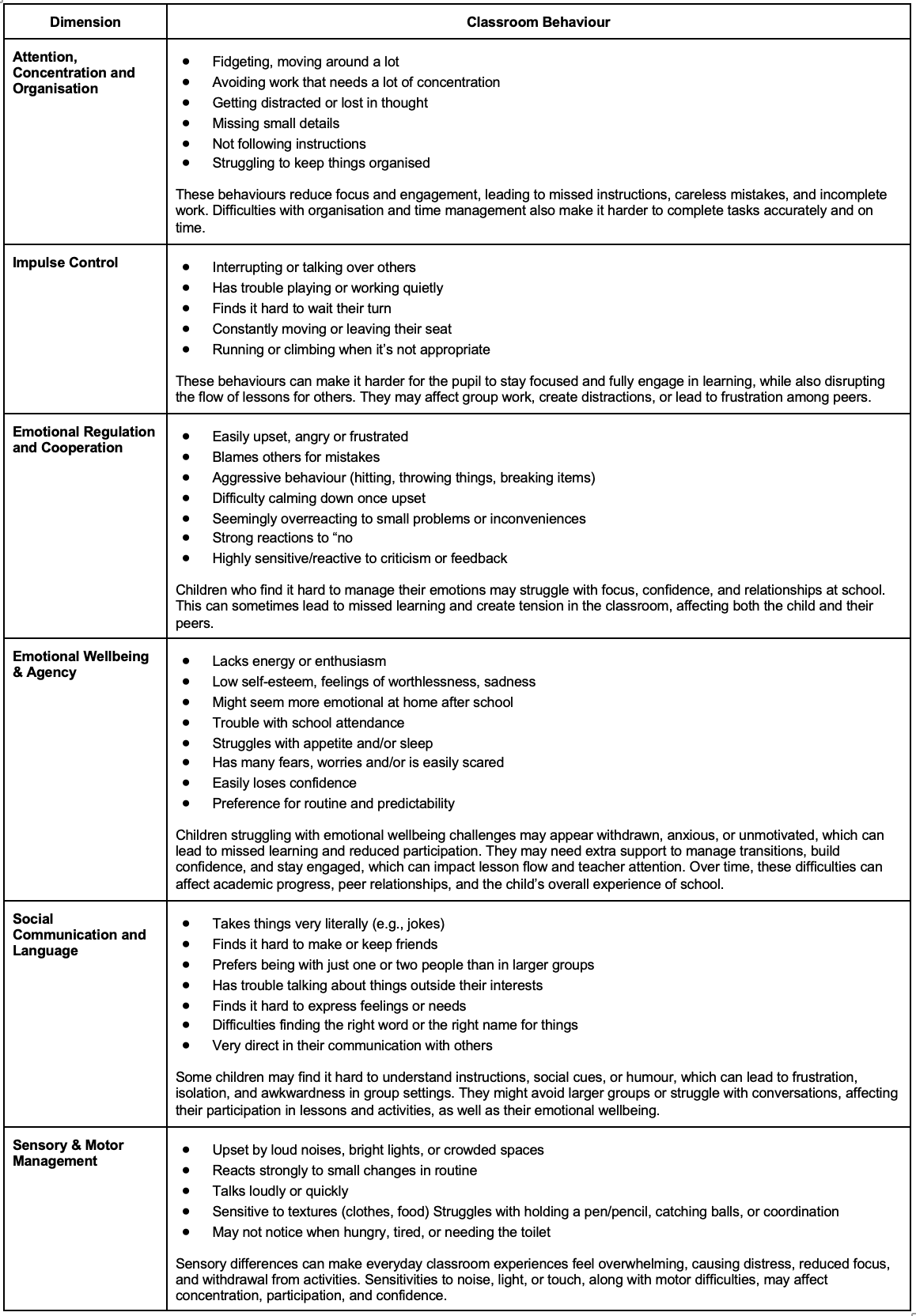
Neurodivergent traits can present in a variety of ways, often differing significantly between children. While diagnostic labels such as ADHD, autism, dyslexia and dyspraxia can provide helpful frameworks for understanding neurodivergence, there is increasing acceptance that these labels alone are not enough to fully understand a child’s needs, as they can manifest in such a variety of ways. For example, two children with ADHD might present very differently: one may appear hyperactive and constantly on the go, while another might seem more introverted, anxious and/or inattentive.
In addition, children will often present with issues related to more than one diagnostic category (overlapping presentations) whilst the services tend to focus on just one diagnosis. Best practice involves focusing on the child’s needs in a holistic manner, and addressing executive functioning and other underlying neurodevelopmental processes.
Furthermore, many neurodivergent children never end up with a formal diagnosis and may face barriers to accessing support. In particular, girls, high-achieving students, and those from minority backgrounds often have needs that go unrecognised due to masking, misinterpretation, lack of understanding, or a combination of these factors.
It is therefore critical to get beneath the diagnosis and understand each child’s unique needs holistically.
Every child has their own set of strengths and challenges, creating a unique profile that shapes how they learn, communicate, and navigate different environments. These differences are often rooted in underlying developmental and neurocognitive processes, such as attention, sensory sensitivities, memory, emotional regulation, and social understanding. These processes can impact how children engage with learning and cope with everyday classroom demands, sometimes in ways that aren't immediately obvious to teachers. As a parent, understanding your child’s unique profile is the first step toward advocating effectively for their needs. It’s important to share your insights with the school and work in partnership with teachers and support staff. By doing so, you can help ensure your child receives the right support - not just based on a diagnosis (if they have one), but on who they are as an individual.

For some children, their neurodivergent traits are noticeable and consistent across multiple settings (such as home, school, and social or leisure environments), making it easier for adults to identify patterns of behaviour and seek appropriate support. However, for many children, these traits can present quite differently depending on the context. A child who appears quiet and compliant at school may express distress, frustration, or exhaustion only at home, while another may seem confident and settled in familiar environments but struggle in unpredictable or socially demanding settings. Factors such as emotional safety, the level of structure or sensory input, relationships with adults, and the predictability of the environment all play a crucial role in how a child copes and self-regulates.
This variability can make it more challenging to identify underlying neurodivergent needs, particularly when difficulties are masked or internalised in certain settings. It can also complicate the diagnostic process, as current criteria often rely on symptoms being consistently observed across both home and school. When differences in presentation occur, parents may feel dismissed or not believed, while schools may not observe the behaviours that cause concern at home. This can delay access to assessment, support, and understanding, leaving both the child and their caregivers without the help they need. Recognising the influence that environment has on behaviour is therefore essential. When your observations as a parent differ from what is seen in the classroom, it is important to trust your instincts and convey these to school to help build an accurate and compassionate picture of your child’s needs.
Early signs that your child may be struggling at school are often subtle and easily overlooked. These can include persistent fatigue, reluctance or refusal to attend school, heightened anxiety, or inconsistent academic performance that doesn’t align with their expected ability. Such signs may not immediately signal that your child has a learning difficulty or is neurodivergent, but they often indicate that a child’s needs are not being fully met. It is worth paying close attention to try to identify any academic, social, emotional, or environmental needs and offer appropriate support at home and at school. This requires a healthy partnership between home and school, involving aligned practical strategies that provide consistent and meaningful support to your child.
Neurodivergent children thrive when the people around them work together and take time to understand their behaviour, helping them to feel safe, valued, and ready to learn. We know that with the right support your child’s brain has the ability to grow and adapt, helping them to learn and thrive in their own unique way. This process, known as neuroplasticity, highlights the brain's capacity to form new connections in response to nurturing environments, targeted skill-building interventions, and positive relationships.
Alongside such support, advocating for your child and working with your child’s school so they can experience a flexible, inclusive classroom environment is key to ensuring your child feels understood and ready to learn.
While many children look forward to special events and changes in routine (e.g. seasonal activities, school trips, or end-of-term celebrations), these experiences can be difficult for neurodivergent children - activities that are intended to be “fun” can cause anxiety, meltdowns, or withdrawal.
For some children the increased sensory input (such as noise, lights and costumes), and unpredictable changes to their routine can feel overwhelming and dysregulating. It is important to understand that these behaviours are often a response to environmental stimuli and offering your child validation and space to express their feelings and preferences is vital.
While it’s understandable for adults to want children to enjoy themselves, it’s also worth keeping in mind that “fun” can mean very different things to different children - expectations to “have fun” in an organised, large-scale manner could be an additional source of pressure and worry for your child.
Supporting your child effectively at school isn’t about moulding them so they fit in with standard classroom and school expectations. Instead it’s about adapting the environment, understanding their unique profile of needs and their behaviour in context, building a system of shared responsibility between school and home, as well as nurturing each child to help them build the skills to cope flexibility in a variety of settings.
If you're unsure where to begin, you can explore our free Profiling Tool to help identify each child’s individual strengths and support needs across areas such as attention, concentration and organisation, sensory and motor management, and emotional well-being and agency. The personalised report can support meaningful conversations you may choose to have with your child’s teachers and other professionals, helping to build a shared understanding of how to help your child thrive.